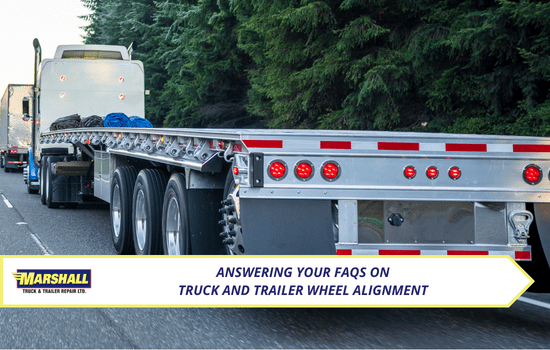Wheel alignment is a critical aspect of maintaining the safety and efficiency of trucks and trailers. Yet, it's a topic that often raises questions among trucking professionals.
Exploring Common Questions about Truck and Trailer Wheel Alignment
 In this blog, we'll address some of the most frequently asked questions (FAQs) related to truck and trailer wheel alignment, helping you understand the importance of proper alignment and how it contributes to the smooth operation of your truck and trailer.
In this blog, we'll address some of the most frequently asked questions (FAQs) related to truck and trailer wheel alignment, helping you understand the importance of proper alignment and how it contributes to the smooth operation of your truck and trailer.
1. What is Wheel Alignment?
Wheel alignment, also known as wheel tracking, is the process of adjusting the angles of the vehicle's wheels to ensure they are perpendicular to the ground and parallel to each other. Proper alignment ensures that the tires make optimal contact with the road, promoting even tire wear and stability.
2. Why is Wheel Alignment Important for Trucks and Trailers?
Wheel alignment is crucial for trucks and trailers because it directly impacts safety, handling, and efficiency. Properly aligned wheels reduce tire wear, improve fuel efficiency, enhance steering control, and contribute to overall vehicle stability.
3. How Often Should I Check Wheel Alignment?
It's recommended to check wheel alignment regularly, typically as part of routine maintenance. Most experts suggest checking alignment at least once a year or when you notice signs of misalignment, such as uneven tire wear, steering pulling to one side, or a vibrating steering wheel.
4. What Causes Wheel Misalignment?
Wheel misalignment can occur due to various factors, including hitting potholes, curbs, or other obstacles, general wear and tear, and improper installation of suspension or steering components. Regular driving conditions and road surfaces can also contribute to gradual misalignment over time.
5. What Are the Signs of Wheel Misalignment?
Common signs of wheel misalignment in trucks and trailers include uneven tire wear, steering wheel off-centre when driving straight, drifting or pulling to one side, and a vibrating steering wheel. If you notice any of these symptoms, it's advisable to have your alignment checked promptly.
6. Can I Align the Wheels Myself?
Wheel alignment is a precise process that requires specialized equipment and expertise. Attempting to align the wheels without the proper tools and knowledge can lead to further issues. It's best to leave wheel alignment to professionals who have the equipment and experience to do it correctly. Our dedicated team specializes in expert truck and trailer alignment, ensuring your vehicles stay on the straight path to success, contact us today!
7. Does Wheel Alignment Affect Fuel Efficiency?
Yes, it does. Misaligned wheels can increase rolling resistance, making your truck or trailer work harder to move forward. This extra effort results in reduced fuel efficiency. Proper alignment reduces rolling resistance, contributing to better fuel economy.
8. Does Wheel Alignment Improve Tire Life?
Absolutely. Properly aligned wheels ensure that the tires wear evenly, extending their lifespan. This not only saves you money on tire replacement but also reduces the risk of sudden tire failures while on the road.
